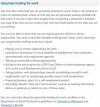Are they really that hard though? Our European counterparts seems to be able to operate it. I see the previous / last payment history as being the easier part of the work in this age of digital data. Revenue Comissioners are already connected to Businesses via their Business registration number & Welfare are already connected to Revenue Comissioners.Working-age income-based benefit schemes are very expensive to administer as there is so much risk of fraud and error. You need a lot of people checking previous payslips and the like.
Flat-rate schemes have their merits. The PUP was not well targetted but it was implemented extremely quickly and kept a lot of people solvent at a difficult time.
The harder part would be the design & deployment / enforcement of the "demonstration of active & constructive job seeking" (my words - not taken from any proposals).
- Actively seek work. What are the criteria & how does the job seeker prove it?
- Secure interviews.
- Reject interviews - why?
- Sit interviews.
- Secure offer.
- Reject offer - why?
- Accept offer.
- Begin work.
- What are the criteria & how does the job seeker prove it for each of the above?
- Should the jobseeker pursue jobs that are below his level of expertise or historical pay grade? If, yes after what period of jobseeking?
- Should the jobseeker pursue jobs that are unreasonably distant / overseas from his home? If, yes after what period of jobseeking? How far is unreasonably distant?
- Should the jobseeker accept a lowball offer? What is a lowball offer?
- & so on - there are an infinite number of "What if" scenarios to be gamed out although I assume we could look over the shoulders of our European counterparts for a hint or two. Why reinvent the wheel.
Last edited:
